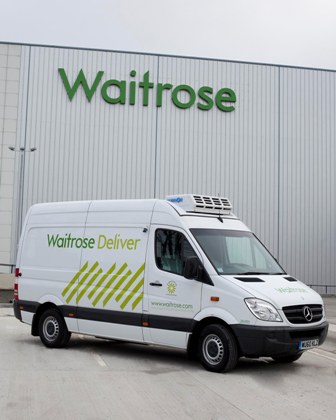
Waitrose has purchased five Mercedes-Benz Sprinter NGT (Natural Gas Technology) vans that run on sustainable fuel made from landfill gas.
Liquid Bio-methane, which has an exceptionally low carbon footprint, is created by extracting naturally occurring methane from organic waste, and converting it into high-quality, clean fuel.
Supplied by Reading dealer Rygor Commercials, the new vehicles are working from supermarkets outside London, and bear logos with the message: 'Using recycled energy - powered by Bio-methane'.
The Sprinter NGT puts Mercedes-Benz in the forefront of the natural gas revolution and underlines, once again, the manufacturer's leadership in the field of clean, 'green' commercial vehicle development.
Exceptionally quiet in operation, the Sprinter NGT emits negligible levels of CO2 when running on methane produced from decomposing organic matter. Gas - whether Bio-methane or compressed natural gas (CNG) - also produces little or nothing in the form of particulate emissions.
The Waitrose vehicles are all 3.5-tonne Sprinter 316 NGT panel vans with insulated bodies by Gray & Adams and Hubbard refrigeration units. Chassis cab, dropsider or Traveliner minibus variants of the gas-powered Sprinter are also available at 3.5 tonnes gvw, as is a 5.0-tonne Sprinter 516 NGT chassis cab variant.
Offering 'real world' practicality and flexibility, the Sprinter NGT is a bifuel vehicle powered by either petrol or gas - the 1.8-litre, four-cylinder engine delivers an impressive 156hp, irrespective of the fuel source.
In standard trim the Sprinter NGT has a Euro 4 engine but Waitrose has opted to upgrade its vehicles to meet the voluntary EEV emissions threshold, which is even more stringent than the Euro 5 limit.
And whereas drivers of standard Sprinter NGTs can change from one fuel source to the other at the flick of a switch, the Waitrose vehicles always default to gas, with the small, 15-litre petrol tank used for back-up only.
"This is a very exciting project," declared Ray Collington, Fleet Engineer for the John Lewis Partnership, of which Waitrose is a part. "We are committed to reducing our CO2 footprint, which is why much of our own food waste goes back into anaerobic digestion.
"We're keen to learn as much as we can from these new vehicles, because we firmly believe that gas has a viable future as an alternative fuel source. Bio-methane gives us a high-performance fuel produced using locally-sourced, sustainable materials - it is a genuine alternative to diesel for us in some applications."
He continued: "Our new Sprinter NGTs have certainly been well received by our Partners, who understand and appreciate the rationale behind what we are doing. The feedback has all been very positive."
The Waitrose vehicles refuel at a facility operated by Gasrec, Europe's first commercial producer of liquid Bio-methane.
Regularly voted 'Britain's favourite supermarket', Waitrose currently has 244 stores in England, Scotland and Wales, plus a shop in Jersey, Channel Islands, and has enjoyed a 25 per cent leap in sales over the past two years. The company recorded its best ever Christmas trading period and plans to open a further 39 outlets this year, creating an additional 3,000 jobs.